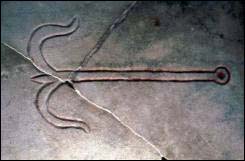Free E-Mail
Bible Studies
Beginning the Journey (for new Christians). en Español
Old Testament
Abraham
Jacob
Moses
Joshua
Gideon
David, Life of
Elijah
Psalms
Solomon
Songs of Ascent (Ps 120-135)
Isaiah
Advent/Messianic Scriptures
Daniel
Rebuild & Renew: Post-Exilic Books
Gospels
Christmas Incarnation
(Mt, Lk)
Sermon on the Mount
(Mt 5-7)
Mark
Luke's
Gospel
John's Gospel
7 Last Words of Christ
Parables
Jesus and the Kingdom
Resurrection
Apostle Peter
Acts
The Early Church
(Acts 1-12)
Apostle Paul
(Acts 12-28)
Paul's Epistles
Christ Powered Life (Rom 5-8)
1 Corinthians
2 Corinthians
Galatians
Ephesians
Vision for Church
(Eph)
Philippians
Colossians,
Philemon
1
& 2 Thessalonians
1 & 2 Timothy,
Titus
General Epistles
Hebrews
James
1 Peter
2 Peter, Jude
1, 2, and 3 John
Revelation
Revelation
Conquering Lamb of Revelation
Topical
Glorious Kingdom, The
Grace
Great Prayers
Holy Spirit, Disciple's Guide
Humility
Lamb of God
Listening for God's Voice
Lord's Supper
Names of God
Names of Jesus
Christian Art
About Us
Podcasts
Contact Us
Dr. Wilson's Books
Donations
Watercolors
Sitemap
Anchor as an Early Christian Symbol
 Anchor, IV sec. d.c., Catacomb of Priscilla, via Salaria Nova, Roma |
The anchor was an early Christian symbol commonly found in the Roman catacombs as a symbol of the hope we have in Christ beyond this life, and is a fitting inscription for a Christian tomb. The symbol doubtless comes from this verse:
"We have this hope as an anchor for the soul, firm and secure. It enters the inner sanctuary behind the curtain, where Jesus, who went before us, has entered on our behalf. He has become a high priest forever, in the order of Melchizedek." (Hebrews 6:19-20)
The anchor is found in the first century cemetery of St. Domitilla, the second and third century epitaphs of the catacombs, and especially in the oldest parts of the cemeteries of Sts. Priscilla (about 70 examples in this cemetery alone), Domitilla, Calixtus, and the Coemetarium majus.
 Christian Roman epitaph of Atimetus from the catacombs of St. Sebastian on the Via Appia, Rome. Inscription flanked by Christian symbols, an anchor and a fish. |
- Petroglyphs from catacomb di S. Callisto. Anchor, and other symbols.
- Chi-rho, Fish, and Anchor symbols, Catacombs of St. Sebastian.
- Good shepherd, Chi-Rho, swastika, anchor, fish, and ichthus from Catacombs of St. Sebastian, Rome
"When the early Christians did represent the sign of the cross on their monuments, nearly all sepulchral in character, they felt obliged to disguise it in some artistic and symbolical way. One of the oldest of the symbols of the cross is the anchor. Originally a symbol of hope in general, the anchor takes on in this way a much higher meaning: that of hope based on the Cross of Christ. The similarity of the anchor to the cross made the former an admirable Christian symbol." (Orazio Marucchi, "Archaeology of the Cross and Crucifix," Catholic Encyclopedia (1908), Vol. 4)
In some anchors, the "stock" at the top of the anchor reminded Christians of a cross.
Large iron anchors were found in the Mediterranean as early as the third century B.C. Ancient anchor.
Maurice M. Hassett, The Anchor (as Symbol), Catholic Encyclopedia (1907), vol. 1.
Copyright © 2025, Ralph F. Wilson. <pastor![]() joyfulheart.com> All rights reserved. A single copy of this article is free. Do not put this on a website. See legal, copyright, and reprint information.
joyfulheart.com> All rights reserved. A single copy of this article is free. Do not put this on a website. See legal, copyright, and reprint information.
 |

|
In-depth Bible study books
You can purchase one of Dr. Wilson's complete Bible studies in PDF, Kindle, or paperback format -- currently 48 books in the JesusWalk Bible Study Series.
Old Testament
- Abraham, Faith of
- Jacob, Life of
- Moses the Reluctant Leader
- Joshua
- Gideon
- David, Life of
- Elijah
- Psalms
- Solomon
- Songs of Ascent (Psalms 120-134)
- Isaiah
- 28 Advent Scriptures (Messianic)
- Daniel
- Rebuild & Renew: Post-Exilic Books
Gospels
- Christmas Incarnation (Mt, Lk)
- Sermon on the Mount (Mt 5-7)
- Luke's Gospel
- John's Gospel
- Seven Last Words of Christ
- Parables
- Jesus and the Kingdom of God
- Resurrection and Easter Faith
- Apostle Peter
Acts
Pauline Epistles
- Romans 5-8 (Christ-Powered Life)
- 1 Corinthians
- 2 Corinthians
- Galatians
- Ephesians
- Philippians
- Colossians, Philemon
- 1 & 2 Thessalonians
- 1 &2 Timothy, Titus
General Epistles
Revelation
Topical

 To be notified about future articles, stories, and Bible studies, why don't you subscribe to our free newsletter, The Joyful Heart, by placing your e-mail address in the box below. We respect your
To be notified about future articles, stories, and Bible studies, why don't you subscribe to our free newsletter, The Joyful Heart, by placing your e-mail address in the box below. We respect your